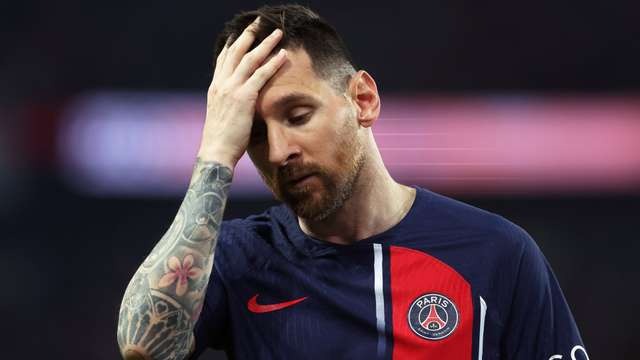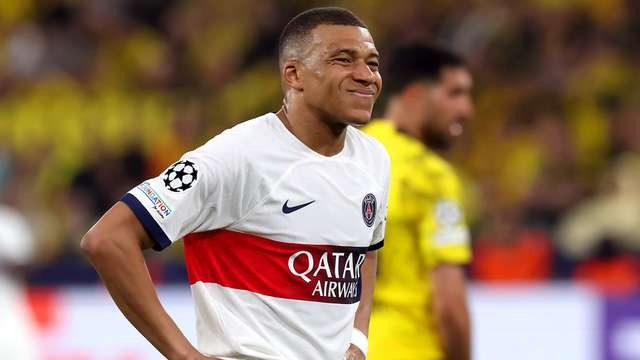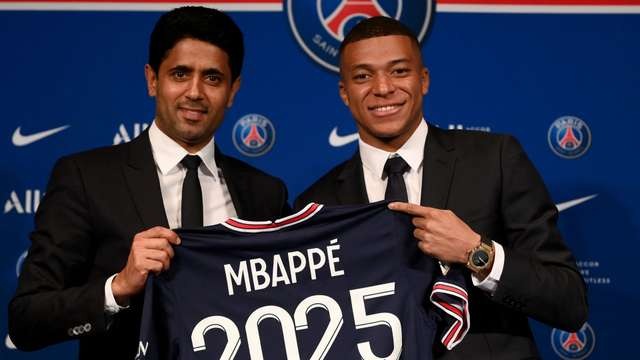After Tuesday’s shock loss to Borussia Dortmund, it’s fair to ask what next for a club that is about to lose its poster boy

Awkward questions were inevitable after Paris Saint-Germain’s latest Champions League humiliation – but that didn’t make them any more palatable for the protagonists of the PSG project.
With his own team now out, after a shock 2-0 aggregate loss to unfancied Borussia Dortmund, Kylian Mbappe was asked whether he would be supporting Real Madrid or Bayern Munich in the Champions League final. The Bernabeu-bound forward rolled his eyes and walked away, perhaps irked by someone other than himself having the audacity to bring up Madrid at a most inappropriate moment.
Meanwhile, PSG president Nasser Al-Khelaifi was even more annoyed when a journalist wondered whether coach Luis Enrique was now in danger of losing his job. “Are you serious with this question?” the PSG president fumed. “Honestly, do you know and understand anything about football?” It was a question that Al-Khelaifi would have probably been better asking himself – and those around him.
PSG have spent approximately €1.9 billion (£1.6bn/$2bn) since the Qatari Sports Investment (QSI) group assumed control at Parc des Princes in 2011 – and yet they remain without a Champions League title.
Assembling superstars didn’t work. And building a team around Mbappe hasn’t either. What next, then, for PSG? Is irrelevance a real risk for a “divisive” club that has become synonymous with excess and embarrassing European exits?

Off-field success, on-field failure
From an economic perspective, QSI have done a remarkable job with PSG over the past 13 years. A club acquired for just €70 million (£60m/$75m) is now valued at €4.25bn (£3.7bn/$4.6bn). Al-Khelaifi has been key to the growth, which has seen PSG rise to third in the latest Deloitte Football Money League.
He is renowned for combining big-picture thinking with meticulous attention to detail. While doing multi-million euro deals with Air Jordan, he is also choosing the caterer for the VIP area at Parc des Princes.
However, Al-Khelaifi has always been acutely aware of on-field success to the credibility of the PSG project, so winning the Champions League has always been the primary objective. In an interview with L’Equipe in 2014, he even promised that the club would conquer Europe within four years. It didn’t happen. And it still hasn’t happened. And PSG only have themselves to blame.

‘Messi more of a marketing deal’
In his very first media appearance as PSG president all the way back in 2011, Al-Khelaifi insisted that club’s objective was not to sign existing superstars like Lionel Messi, but unearth the next generation of gems – and yet after a decade of disappointment, PSG handed the Argentine attacker a colossal contract at the age of 34.
Perhaps no deal better illustrated PSG’s desperation – or the unhealthy obsession with high-profile players that the supporters came to despise. Indeed, in the eyes of fans, Messi, for all his genius, personified PSG’s problems.
As one disillusioned supporter told GOAL after the World Cup winner’s not-so-fond farewell in the summer of 2023, “Messi was more of a marketing deal than a sporting signing. He ended up representing everything we have hated about the QSI project for the past three or four years.”

Neymar and Mbappe: From friends to foes
It had all started, of course, with the sensational double-swoop for Neymar and Mbappe in 2017, when PSG shook up the football world with the two biggest deals in the history of the game. The attacking duo very nearly led the club to the promised land, but Thomas Tuchel’s PSG were beaten by Bayern Munich in the 2020 Champions League final – and it all ended in acrimony.
Neymar and Mbappe went from friends to foes, creating a dressing-room divide that ultimately undermined another remarkable transfer window in the summer of 2021, when not only Messi arrived on a free transfer, but also Gigi Donnarumma, Sergio Ramos and Gini Wijnaldum. PSG couldn’t even get over the line with a collection of proven winners – and the identity of the coach appeared to make no difference either.
When it was pointed out to Unai Emery in an interview with L’Equipe that he was one of three former PSG coaches in the quarter-finals of the 2021-22 Champions League, along with Carlo Ancelotti and Thomas Tuchel, he said, “That means they are all very good coaches. If they didn’t make it with PSG, it’s because there’s something else…” Something wrong, basically, something rotten.

‘Hard to build a team around Mbappe’
Former sporting director Leonardo belatedly came to the conclusion that the increasingly petulant Mbappe wasn’t part of the solution at Parc des Princes, but a major part of the problem.
“For the good of PSG, I think the time has come for Mbappe to go, no matter what,” Leonardo argued in an interview with L’Equipe after being replaced as sporting director in 2023 by Luis Campos. “Paris-Saint-Germain existed before Kylian Mbappe and it will exist after him.
“He’s been in Paris for six years and, over those six seasons, five different clubs have won the Champions League (Real Madrid in 2018 and 2022, Liverpool in 2019, Bayern Munich in 2020, Chelsea in 2021 and Manchester City in 2023) – none of which had Mbappe in their ranks. That means it’s entirely possible to win this competition without him.
“With his behaviour over the last two years, Kylian is showing that he’s not yet a player capable of really guiding a team. He’s a great player, not a leader. It’s hard to build a team around him.”
PSG tried anyway.

PSG’s de facto sporting director?
The club backed Mbappe to the hilt after his power struggle with Neymar, and while they’ve always denied making him the club’s de facto sporting director, it’s clear that many of last summer’s signings were made with Mbappe in mind, with Ousmane Dembele and Randal Kolo Muani the most obvious examples.
The new strategy hasn’t paid off, though. It didn’t deliver a Champions League title, nor did it convince Mbappe to stay in Paris, meaning it’s only right to question the wisdom of indulging the France forward for so long – and at such a colossal cost to the club, both in terms of money and image.
Indeed, Mbappe once insisted that PSG were not “Kylian Saint-Germain” but it’s felt like that for a long time now, with the 25-year-old made to look bigger than the club primarily because his employers treated him as if he were.

‘Bright future’ without Mbappe?
Losing Mbappe may, thus, prove a blessing in disguise, and Al-Khelaifi spoke defiantly after the Dortmund defeat on Tuesday. “We are building a long-term project with the youngest squad in Europe, the future will be bright,” he insisted. “We will keep going.” And likely with the support of the club’s frustrated fans, who stood by Luis Enrique’s players after the 1-0 loss at home to Dortmund. They arguably feel that they might just be about to get their club back; that maybe QSI have finally seen the error of their ways.
There is simply no disguising the fact, though, that Mbappe, the boy from Bondy who became the world’s best player, should have been the poster boy of the new era in the French capital – only for PSG’s owners to prove utterly incapable of managing a monster all of their own making.
Now, without “the cornerstone of the club’s project”, as Al-Khelaifi put it himself, there is a very real risk of the whole QSI enterprise coming crashing down. After all, PSG have always leaned heavily on big names to boost the profile of a club formed in 1970. Ligue 1 simply does not generate anything like the same interest or revenue as other Europe leagues – primarily because state-backed PSG have turned it into an uncompetitive and unattractive one-horse race with their bottomless well of oil money – so they’ve always needed players like Zlatan Ibrahimovic and David Beckham to attract viewers and sponsors.
The club’s social media following peaked during the Neymar, Mbappe and Messi era – but not one will be left at Parc des Princes come the start of next season. What next, then, for PSG? An even more uncomfortable question for Al-Khelaifi & Co would be, without Mbappe, how many people actually care?
